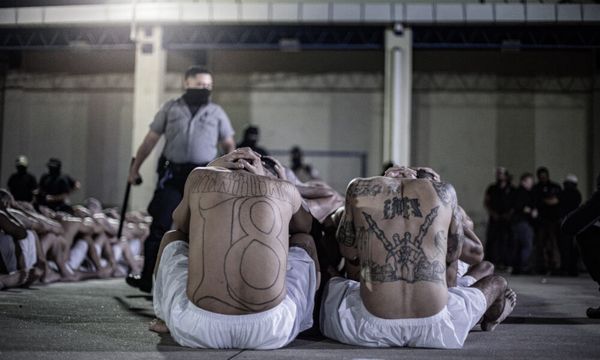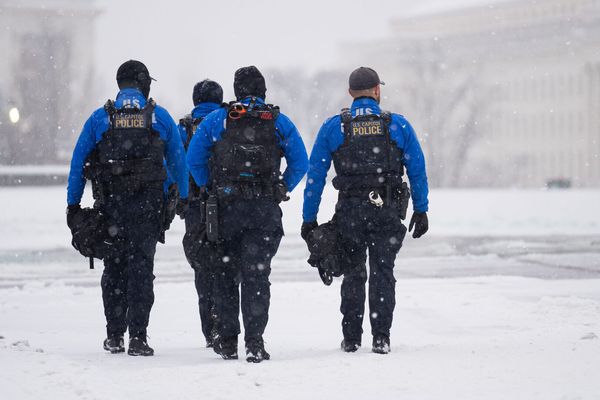
Hot on the heels of Senator Fatima Payman being labelled by our ever-prescient media “the Pauline Hanson of the left”, the moral panic triggered by Payman’s defection from the Labor Party has coalesced into two fears: “identity politics” (which will be the death of all of us) and the unique risk that Muslims apparently pose for our perfectly secular social contract.
All the bed-wetting over this predicted eruption of sectarianism triggered a distant memory: it was Hanson who warned us!
Hanson’s inaugural speech, on her return to Parliament as a senator in 2016, rang the Muslim bell loud. Down the list of disasters that would follow our being “swamped by Muslims”, was this: “Muslims want to see sharia law introduced in Australia”. Sharia, she said, “conflicts with our secular state”.
Consider the current outbreak of dog-whistling — from Anthony Albanese’s warning that “faith-based political parties” would “undermine social cohesion”, through Peter Dutton’s dire prediction that “Muslim candidates from Western Sydney” might soon be disturbing the peace by, um, participating in democracy, all the way down to Andrew Bolt, reliably the bottom dweller with his concern that Payman is “the sweet face of a brutal danger – a new politics that could really tear our country apart”.
Then recall Hanson’s words: “Australia is predominantly a Christian country, but our government is secular … The separation of church and state has become an essential component of our way of life”.
At the political level, it’s a little surprising, given the long, overtly religious but panic-free participation of the Christian Democrats and Family First in state and federal parliaments, not to mention the fact that every day of business in Canberra begins with the (definitely Christian) Lord’s Prayer. There’s also the small matter of Scott Morrison, who became prime minister after God sent an eagle painting to tell him to run.
But what of our magically secular law, now under religious threat for the first time? I have to say, it comes as a shock to me to learn that it’s been kept so perfectly separated from church to date.
That’s partly because the Australian constitution isn’t exactly free of it. Apart from the constitutional fact that our head of state — the king — is also a religious leader (head of the Church of England), the constitution itself is a schedule to an act of the British Parliament, and the opening words of that act declare that the federation of Australia was being committed to by its people “relying on the blessing of Almighty God”.
Delving more deeply into the thicket of laws that govern our lives, you don’t have to look far to find some distinctly non-secular roots. Criminal law is rich with examples, unsurprisingly because religious doctrine is essentially where the determination of enforceable right and wrong began.
Bigamy and polygamy are still crimes in Australia; they have no rational basis that isn’t connected to religious faith. Homosexuality, when it was a crime — like witchcraft, blasphemy and abortion — was proscribed solely because it offended religious, specifically Christian, beliefs.
When John Howard amended the Marriage Act in 2004, with the support of the Labor Party, to include a definition stipulating that “marriage” was only between a man and a woman, there was nothing behind it whatsoever but the dominant religious conviction that the legal institution of marriage and the religious institution of marriage were indivisibly the exact same thing.
When that was finally reversed and same-sex marriage recognised by law, nobody complained about the explicitly religious preservation of the right of churches to refuse to marry gay couples. All of the immunities from the operation of anti-discrimination laws granted to religious organisations are, obviously, direct insertions of religion into law.
In broad terms, Hanson was half-right. Australia was, from invasion in 1788 through federation in 1901 and up to some point in the past 20 years, predominantly a Christian country. Christianity was intrinsic to the mission of colonisation, embedded in the monarchy and absolutely central to the Victorian ideal of white civilisation.
When the explorer John McDouall Stuart ascended Mt Stuart in Central Australia in 1860, he planted the British flag and noted in his diary that “we gave three hearty cheers for the flag, the emblem of civil and religious liberty, and may it be a sign to the natives that the dawn of liberty, civilization, and Christianity is about to break upon them”.
I don’t want sharia law either (nor do most Muslims). But to claim that the status quo we’re being told needs defending is an ecumenical wonderland, devoid of any prior religious influence, is delusionally ahistorical.
Understanding that goes a long way towards explaining the blindness of the present hypocritical fever about another religion.







